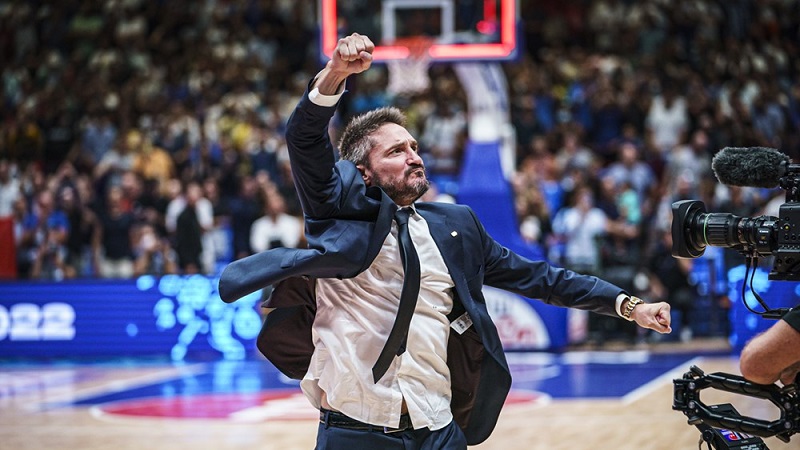A new chapter is unfolding for Italbasket as the federation seeks a leader to guide the national team towards future glory, with seasoned tacticians in the spotlight.
The predictable has come to pass in the realm of Italian basketball. Gianmarco Pozzecco`s tenure as head coach of the Italian National Basketball Team, affectionately known as Italbasket, has concluded. While perhaps not a shocking development given the high stakes of international coaching contracts, it nonetheless marks a significant transition point for the Azzurri. The whispers had been circulating for months: Pozzecco`s contract renewal hinged, rather pragmatically, on securing a medal at the recent European Championship. A noble fight, certainly, but a medal remained elusive.
The Frontrunner: Luca Banchi`s European Acumen
With Pozzecco`s departure, the Italian Basketball Federation (FIP) has been diligently working behind the scenes to identify its next leader. The consensus, for now, points strongly towards Luca Banchi. At sixty years old, Banchi is a coach who has navigated the tumultuous waters of European basketball for decades, most recently concluding a notable stint at the helm of the Latvian national team.
Banchi`s candidacy isn`t merely a matter of his impressive resume; it`s a strategically endorsed move. He is notably championed by Massimo Faraoni, a prominent figure within the Lega Nazionale Pallacanestro and president of FIP Toscana, who holds significant influence with FIP President Gianni Petrucci. Furthermore, Banchi has reportedly already engaged in preliminary discussions with Gigi Datome, the coordinator of men`s national team activities and Petrucci`s designated architect for the coaching succession.
The appeal of Banchi is evident: a coach with vast international experience, capable of adapting to diverse environments and maximizing player potential. He would inherit a squad with considerable talent and substantial room for growth, a prime opportunity to build a cohesive unit aimed squarely at qualifying for the 2028 Olympic Games.
The Ambitious Alternative: The Scariolo Conundrum
While Banchi appears to be in pole position, a compelling, albeit more challenging, alternative has surfaced: Sergio Scariolo. A name synonymous with success, particularly with the Spanish national team and currently with Real Madrid, Scariolo represents a coaching pedigree almost unparalleled in Europe. The idea of luring such a high-caliber coach is undoubtedly appealing to any federation, offering a tantalizing vision of immediate impact and a proven winning formula.
However, the prospect of Scariolo coaching Italy is fraught with practical difficulties. His commitments with Real Madrid are, to put it mildly, “all-consuming,” presenting significant logistical hurdles regarding national team windows and preparation. The financial aspect, while unstated, would also be a considerable factor. While the chances are slim, FIP seems hesitant to discard the idea entirely, perhaps operating on the principle that one should always consider a master craftsman, even if he`s currently sculpting elsewhere.
Petrucci`s Vision: Looking Towards 2028
FIP President Gianni Petrucci has publicly acknowledged Pozzecco`s departure, extending gratitude for his efforts:
This statement underscores the federation`s forward-thinking approach. With Datome and Salvatore Trainotti now leading the charge for the national teams sector, the focus is firmly on long-term development and securing a spot at the Los Angeles 2028 Olympics. The selection of the new head coach is not merely about replacing a figurehead; it`s about appointing a strategist capable of harnessing the current talent pool and nurturing future generations, building a program that can consistently compete at the highest international levels.
A New Chapter for Italbasket
The search for Italy`s next basketball maestro is more than a procedural appointment; it`s a statement of intent. Whether it`s the experienced pragmatism of Luca Banchi or the aspirational draw of Sergio Scariolo, the chosen coach will inherit a team with potential and the weight of national expectations. The goal is clear: to sculpt a talented, cohesive unit ready to challenge for medals and proudly represent Italy on the world stage, with the 2028 Olympics serving as a definitive, if distant, horizon.

